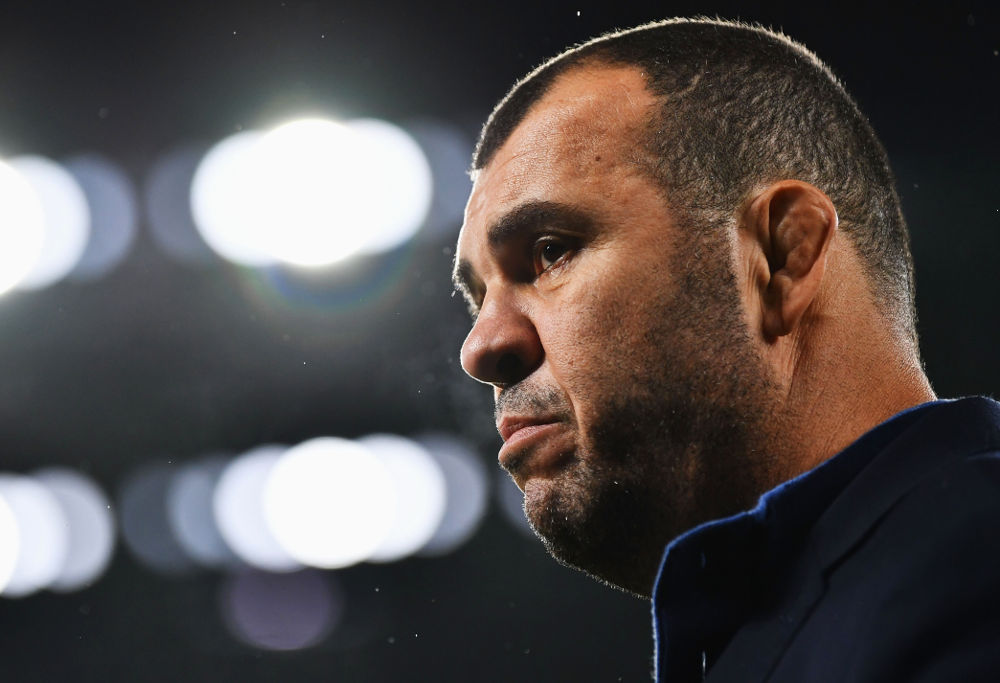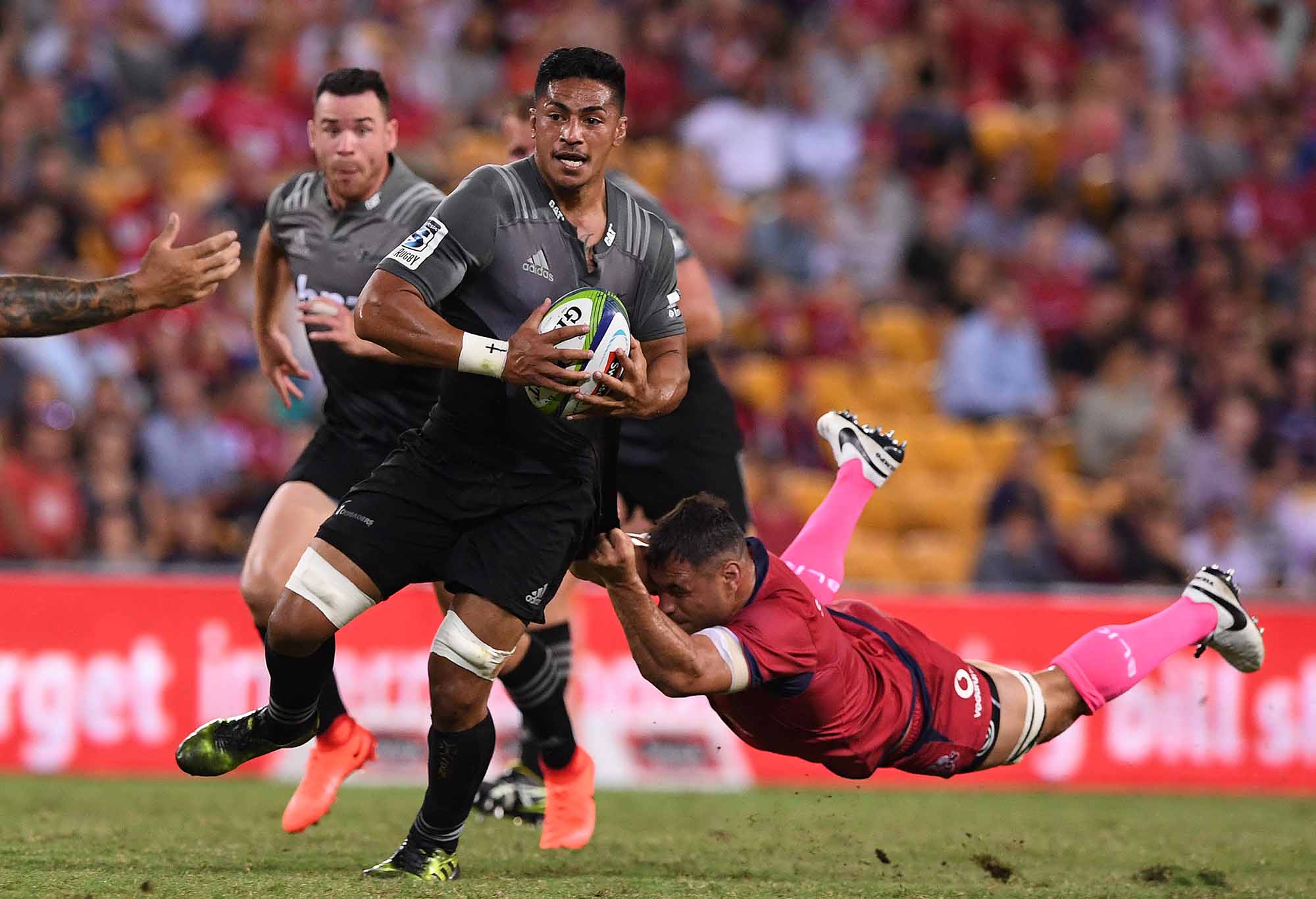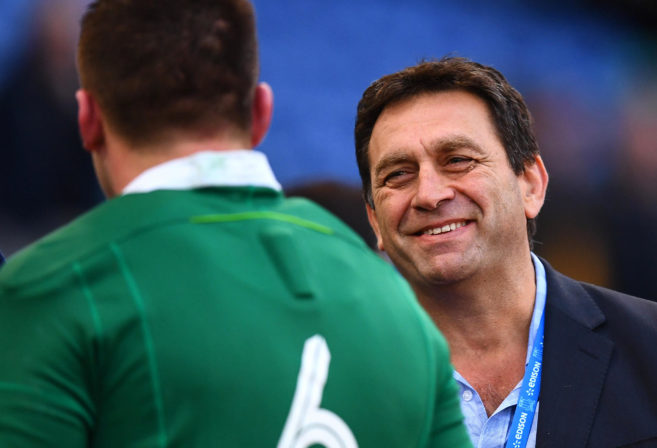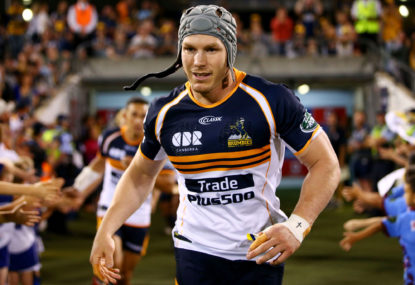What does Rugby Australia need?
Centralised contracts!
When does it need them?
Now!
The row between Michael Cheika and the Brumbies franchise over resting David Pocock, Allan Alaalatoa and Scott Sio from Sunday’s match against the Sunwolves to keep them fresh (or fresher) for the crucial first Test against Ireland reveals the urgent need for a centralised contract system to force the franchises and the Wallabies to move in one forward direction.
For decades the states have contested priority rights over the players against the central rugby organisation, Rugby Australia (the former ARU).
There was a tour to New Zealand where Queensland players withdrew over a dispute over a coach in the amateur era.
And this debilitating antagonism between the states and the central rugby authority continues.
Wallaby coaches in the professional era, with far more Test rugby to fit into a player’s schedule, have had numerous conflicts with the Super Rugby coaches.
The fault lies with the state unions and their determination to exercise total control over their players, even at the expense of the Wallabies and the prestige a winning national side brings to the rugby game.
Michael Cheika has gone out of his way to try to get rid of this blight on the organisation of the rugby game in Australia. He has kept in close contact with the Super Rugby franchises. Expertise from the Wallabies coaching staff has been made available when requested.
But to no avail, as the stand-off between the Brumbies and Cheika over the three players indicated.
The Brumbies wanted to ensure a victory over the depleted Sunwolves to keep their (slight) chances of making the Super Rugby finals alive. Ironically, the Sunwolves had left their Test players in Japan to prepare for their internationals. The franchise, too, wanted to achieve a 15,000 crowd. They needed, it was argued, the Brumbies’ star Wallabies to entice the followers to attend the match.
Cheika wanted an extra day of preparation for the three players ahead of the Test against Ireland on Saturday.
And the Brumbies wanted the players to win a vital Super Rugby match for the franchise, and bring in the crowd.

(Photo by Dan Mullan/Getty Images)
The puzzling aspect of this stuff-up is that Rugby Australia, Cheika and the Brumbies knew at the beginning of the season that the Brumbies were playing the Sunwolves on the Sunday afternoon before the Saturday Test.
Why did everyone let the problem fester until it came to a head too late in the day?
The answer is that Cheika and Rugby Australia have no real power over a Super Rugby franchise.
Rugby Australia could have ordered the three players to be rested on medical grounds. But this would have raised the issue of them playing a Test six days later.
As it happened, the Brumbies were only told about resting the three players by Rugby Australia about a week or so before Sunday’s match.
On the day, the Brumbies played out a tight first half, going into the changing rooms with a 19-10 lead.
When the lead was extended to 29-17, at the 55-minute mark, David Pocock (a try and a couple of nice passing touches) and Scott Sio sauntered off the field.
None of the other Wallabies playing were injured, despite Tom Banks and Tevita Kuridrani playing out the 80 minutes.
In the end, Michael Cheika lost only one Wallaby from the weekend’s play, young Rebels hooker Jordan Uelese.
Rugby Australia and Rugby New Zealand also came to an agreement over the release of Peter Samu.

(AAP Image/Dave Hunt)
The Wallabies squad, therefore, survived the round of matches much better than the All Blacks squad with question marks over injuries (Brodie Retallick) and a commission inquiry (Liam Squire).
But to avoid any future stuff-ups Rugby Australia should put in protocols about how much rugby the Wallabies could play in the Super Rugby tournament, something that the New Zealand Rugby Union has done. Why was this not done?
The answer to the question is this: Rugby Australia does not have a central contracting system for all its professional players, coaches and staff. That is the problem.
Two countries have this system: New Zealand and Ireland.
These two countries are currently number 1 and 2 on the World Rugby rankings table.
As Mark Ella pointed out in a recent (and excellent) column in The Australian: “You could argue that New Zealand is a great rugby nation and would have enjoyed that success no matter what administrative system was in place but you’d be wrong. The reason New Zealand adopted the centralised model in the first place was because at the time the All Blacks were struggling to beat the Wallabies. Can you imagine?”
“That success” that Mark Ella was talking about includes the fact that “the All Blacks have held the Bledisloe Cup since 2003 and New Zealand teams have won 15 of 22 Super Rugby titles.” He might have mentioned, too, that the All Blacks have won the last two Rugby World Cup tournaments, in 2011 and 2015.
On the back of the centralised contracts system, Ireland have become a world power in the rugby universe. They are the current Grand Slam Six Nations champions and defeated the All Blacks in recent years for the first time since a Test was played between the two countries in 1905. Leinster has just won the European Cup.
And, again to quote Mark Ella, “luck of the Irish, I guess. Funny thing about Ireland, its centralised system is run by Australian David Nucifora…”

David Nucifora. (Photo By Stephen McCarthy/Sportsfile via Getty Images)
The Ireland team now in Australia, the product of Nucifora’s planning and Joe Schmidt’s coaching and selecting, is arguably the greatest squad the Irish Rugby Football Union has ever assembled.
The challenge this team and its New Zealand coach Schmidt poses for the Wallabies is that it is a much better side than Eddie Jones’ England squad which defeated Michael Cheika’s men 3-0 for the first time in a series played in Australia between the two countries in 2016.
The irony in all of this is that Nucifora and John O’Neill, chief executive of Rugby Australia (the then ARU), were virtually forced out of their jobs because the states, especially NSW and Queensland, would not allow them to set up the centralised system that had been agreed to by then ARU board.
The most worrying aspect of all this is that when Raelene Castle, the current chief executive, was debating (in print) the future direction of Australian Rugby with Alan Jones, she did not mention the centralised system once.
Let us be very blunt here: If Raelene Castle and the Rugby Australia board do not immediately set in train a process to bring in centralised contracts system, with emphasis on “immediately,” then they should all consider resigning.
Again, this is not a journalist spouting out here. Here is Mark Ella, again: “Let’s face it, NSW and Queensland together are Australian rugby, but until they realise Australia’s federated rugby system is antiquated it is going to be difficult, if not impossible, to progress the game in this country.”
In the face of these difficulties, Michael Cheika has done a good job in selecting his Wallabies squad to confront a rampant Ireland side. There is the right balance between experience and maturing talent. There is a lot of speed in the backs and some size in the forwards.
[latest_videos_strip category=”rugby” name=”Rugby”]
The top Australian sides played well, too, over the weekend. So his best players are in form.
The Rebels in defeating the Blues at Auckland recorded a rare Australian victory at Eden Park, the first since the Brumbies won in 2013.
In the Super Rugby context, the Rebels were the first Australian side to win in New Zealand in three years and 32 games. It was the first win in New Zealand by the franchise.
The Wallabies in the side, Dane Haylett-Petty, speedster Jack Maddocks (a potential Beauden Barrett, if he gets the right coaching) and Adam Coleman, were in terrific form, a good sign for Michael Cheika.
The Reds-Waratahs match produced 15 tries, the Waratahs’ highest total (52) against an Australian Super Rugby team, the most points in an all-Australian contest (93) and the highest number of points scored by the Reds in a loss.
You could complain about the defence but the attacking play, especially of the Waratahs, was brilliant in its deadly set-piece moves and their execution.
All the Wallabies in the Waratahs were in excellent form, with the leaping of Israel Folau resembling extra-terrestrial play.
Essentially, though, the Wallabies go into Saturday’s Test under a disadvantage. The Super Rugby teams have looked after their own interests, sometimes to the detriment of the performance of their star players in the national team.
How much better could the performance of the Wallabies (and the Super Rugby teams) be if they were part of a system where all the brains, expertise and planning at the highest levels of the game were concentrated on working together to benefit all the levels of the game?
So let’s hear the chant for reform. All together now. And you, too, Raelene Castle and the board of Rugby Australia.
































































































